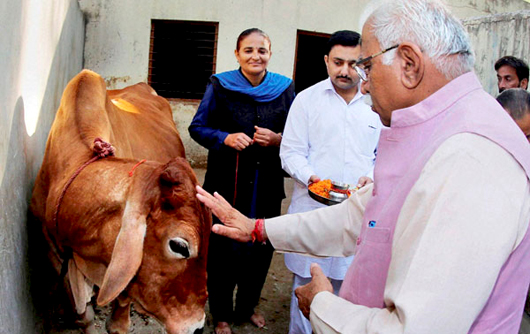Chandigarh, Mar 14: The anti-cow slaughter bill mulled by the BJP government in Haryana may have a provision of imprisonment of up to ten years. In the proposed ‘Govansh Sanrakashan and Gau Samvardhan’ (Cow Protection and Cow Conservation and Development) Bill’ efforts will be made to have tough law on cow slaughter and for conservation and better care of indigenous cattle, Haryana’s Health Minister, Anil Vij said today.
While Vij did not elaborate on the penal provision under the proposed law as the Bill is yet to be introduced in the Assembly, a senior official, who did not wished to be named, said that under the present law, there is provision of five years rigorous imprisonment.

“We are examining it now,” he said, indicating that the new provisions could invite imprisonment up to ten years, though he added the final call on the issue is in the domain of the Haryana Assembly, which will take a decision on the final outcome of the Bill.
Capital punishment for cow slaughter was unlikely, he said when asked to comment on some reports in this regard. Earlier, reacting to opposition in some quarters to BJP government’s proposed Bill, Health Minister Vij sparked a fresh row saying “tomorrow, will we also have to keep in mind the sentiments of those who will say they have become cannibals?”
“Some people who are against our move to bring in tough law against cow slaughter want that sentiments of those who consume beef be kept in mind. “Tomorrow, if someone becomes habitual of eating human flesh, will we have to also keep in mind their sentiments as well?” Vij, the outspoken BJP leader, told reporters.
He also posted his views on his Twitter handle, circulated it on Whatsapp and posted his views on Facebook. Vij, the Ambala Cantt MLA, said the Manohar Lal Khattar government was committed to strict law on cow slaughter. He said it is not that Haryana did not have provisions in law for this earlier. But the old law was found lacking, which is why the present government wants to bring a new law.
“We want to have a proper and strong law so that no one indulges in cow slaughter or sells its meat,” he said. He said that the state is all set to introduce a Bill in the Assembly for “protection and upkeep” of cows. The budget session of the state Assembly began here on Monday and is scheduled to continue till March 25.
In the proposed ‘Cow Protection and Cow Conservation and Development Bill’, efforts will be made to have tough law on cow slaughter and for conservation and better care of indigenous cattle, Vij said, without elaborating what tough provisions will be there in the proposed law.
Asked if the move was part of BJP’s plan to implement its “Hindutva agenda”, Vij said that whatever the government intends to do now was very much part of its election manifesto. “People accepted this and gave us their support, now it is the government’s duty to implement this and have a law in place,” he said.
Asked if the move will hurt the sentiments of some minorities and others who consume beef, Vij said, “We treat cow as holy. Whatever has been said in the country regarding cow over centuries, cannot match any other animal. Sentiments of so many people are connected, let people eat whatever they want, but keep cow out of that.”
He said that the government is keen to provide subsidy to the tune of 50 per cent on establishment of dairy unit of indigenous cows. The state will provide financial and technical support to cow welfare organisations like Gaushalas, Gau-Greh, Gau-Abhyaranya, Gau-Sadan, Gokul Gram that are engaged in maintenance and care of sick, injured, stray and uneconomic cows.





Comments
Add new comment